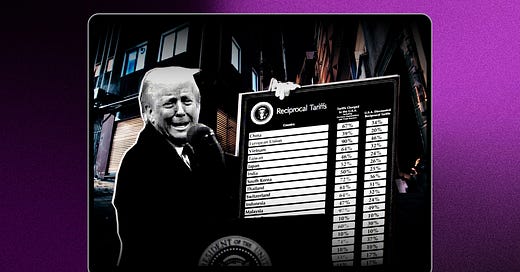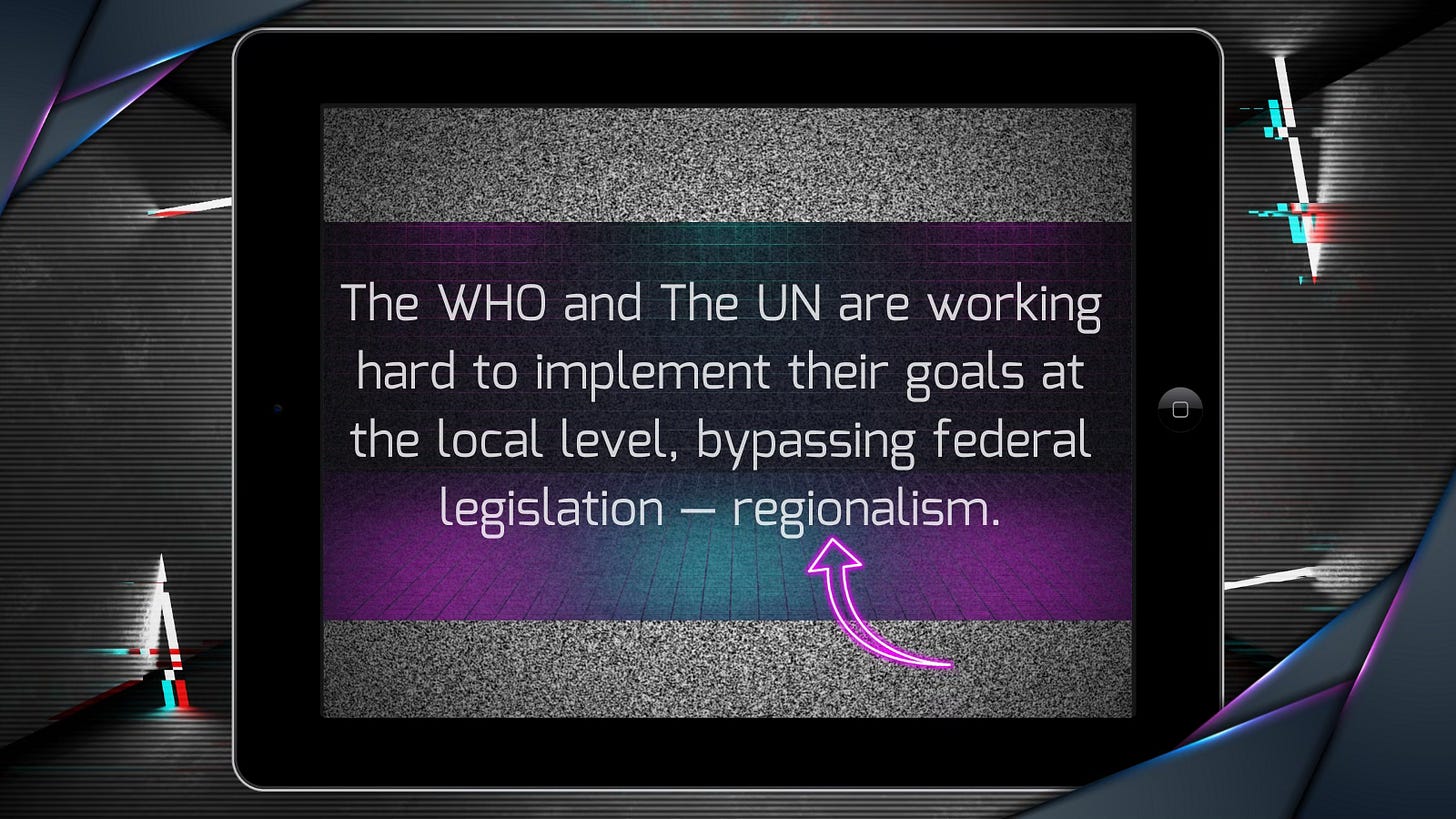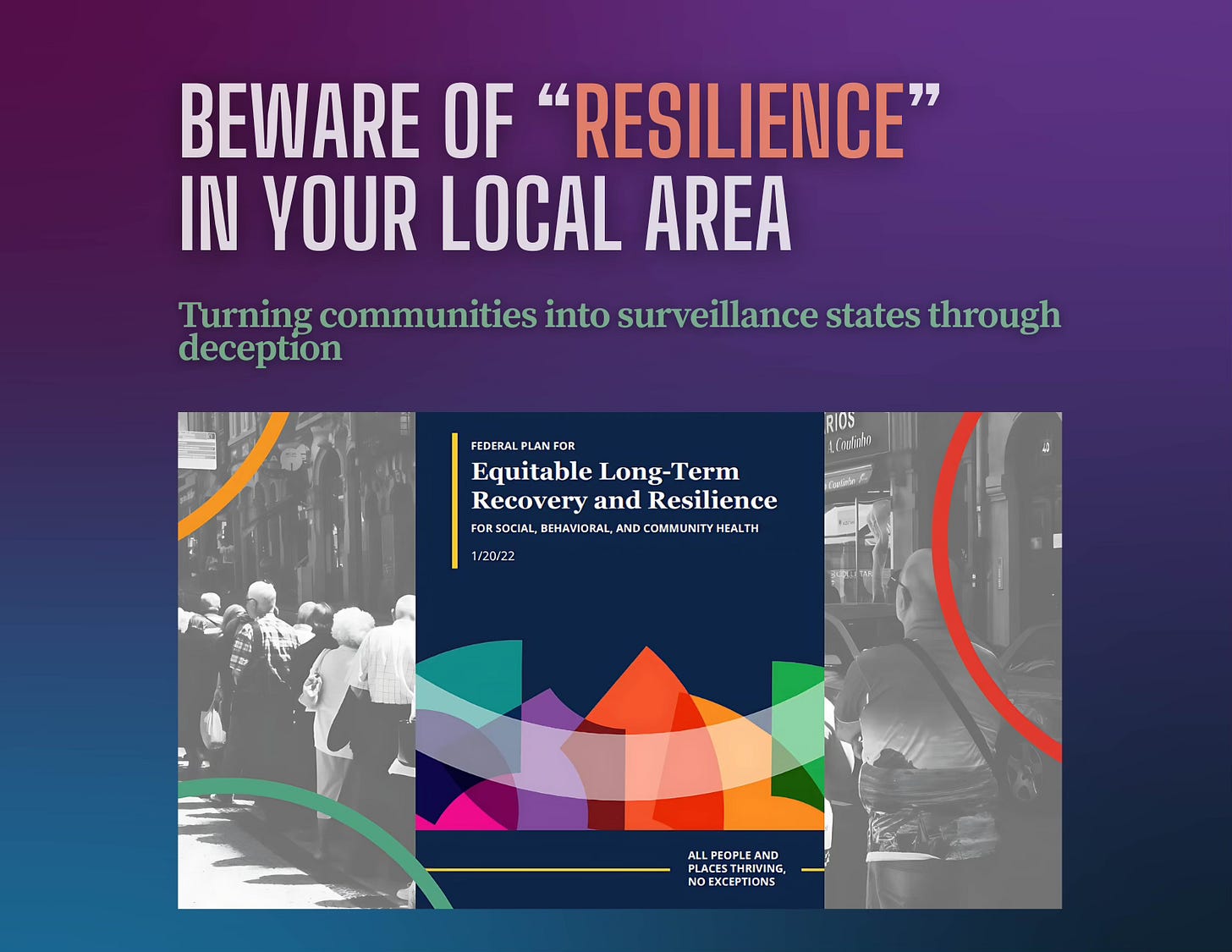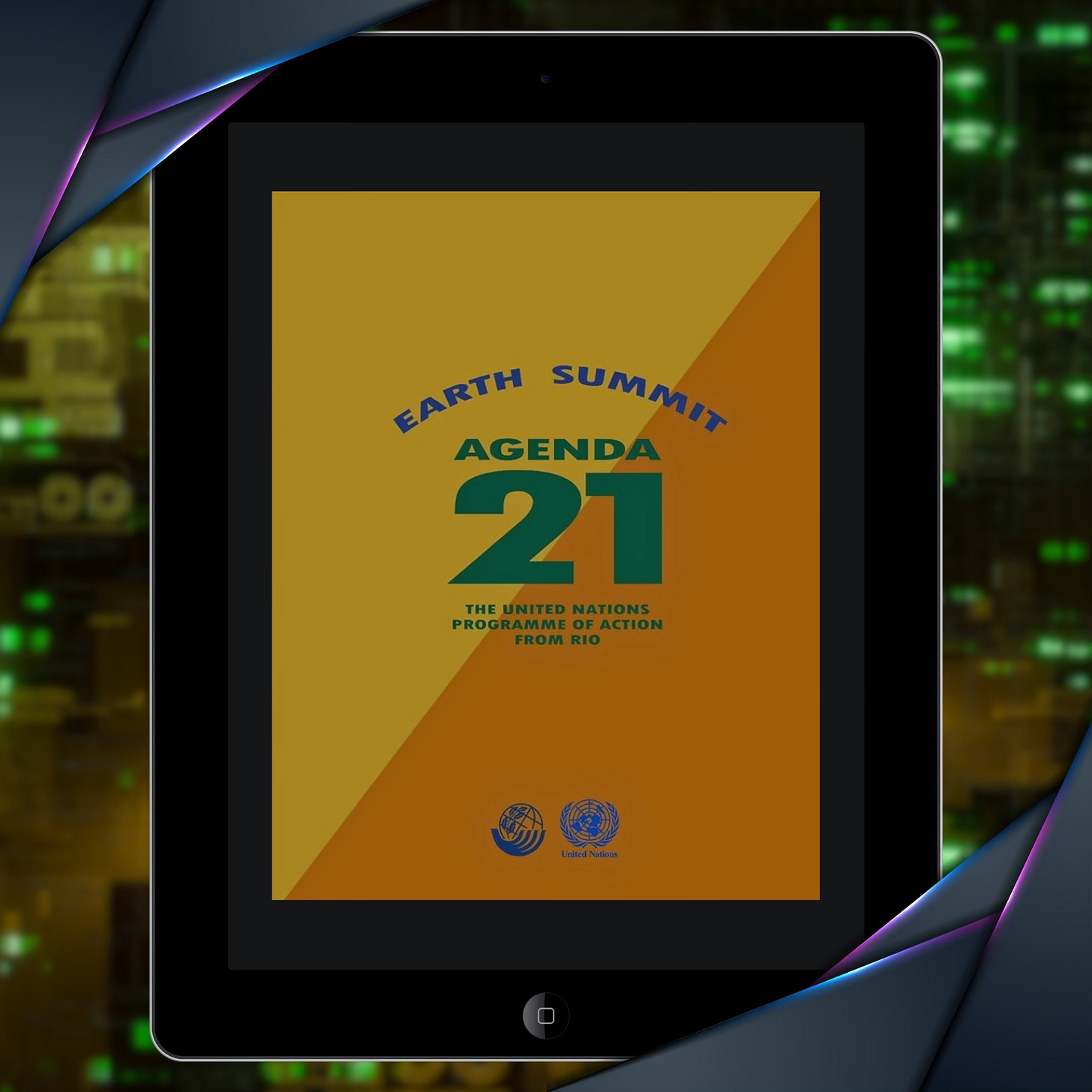Trump's Tariffs and the Trojan Horse of Technocracy
The staged rollout of global governance + how to stop it.
In 2023, the Trilateral Commission quietly declared the year to be "Year One of the New International Economic Order" (NIEO). Just months later, Sir Keir Starmer—UK Labour leader and a fellow Trilateral insider—announced the end of globalization and the beginning of a new era.
Far from a victory for national sovereignty, these pronouncements mark a pivot from open globalization to managed regionalism, a key step in a longer, carefully choreographed transition toward a centralized, post-democratic technocratic control grid. Many know it by its softer names:
"public-private partnership,"
"multi-stakeholder governance," or
"sustainable development."
But make no mistake—this is Technocracy 2.0.
From Free Trade to Fortress Regions
Former President Donald Trump’s tariffs and trade renegotiations were heralded by many as a populist stand against globalist overreach. Much more likely, however, the tariffs are laying the groundwork for regionalized economic blocs that mirror the European Union’s supranational model.
The USMCA (United States-Mexico-Canada Agreement) replaced NAFTA under Trump’s leadership and aligned North America into a tighter regulatory and economic framework. Simultaneously, Trump proposed a 10% universal baseline tariff on all imports and even floated a 60%-245% tariff on Chinese goods, promoting de-globalization rhetoric that has only accelerated regional decoupling.
These actions, while appearing nationalist, in effect served the long-game strategy laid out by globalist architects like Lincoln Bloomfield and John Foster Dulles, who envisioned a world system where regional blocs dissolve national sovereignty before merging into a single global authority.
"Ever larger units evolve through customs unions, confederation, regionalism, etc., until ultimately the larger units coalesce under a global umbrella."
— Lincoln Bloomfield, CFR, 1962
Regionalism: The Middle Step They Don't Want You to Notice
As Alex Newman writes in The New American:
“The Deep State’s globalist plan for what insiders refer to as the 'New World Order'... begins with submerging the sovereignty of nation-states into regional 'orders'... Eventually, these regional orders will be interwoven into an overlapping patchwork of multilateral regimes on the road to creating a truly global authority.”
This is why Starmer’s declaration is so critical: it’s not a retreat from globalization, but a rebranding of it. Regionalism is now the buzzword—sold to the public as a local, pragmatic solution to crises. In reality, it’s an intermediate governance model designed to remove the sovereignty of individual nations while pretending to restore it.
Note: The only true defense of sovereignty is bottom-up; Informed and vigilant citizens, active at the local level is the most effective weapon against tyranny of all forms.
Technocracy 2.0: Governance Without Consent
This stage of technocracy doesn’t need tanks or treaties—it runs on
algorithms,
behavior metrics, and
stakeholder consensus.
Whether it’s COVID health policy, climate regulations, or ESG compliance, the real enforcement arm of global governance will aim for local and regional dominance.
City councils, school boards, public-private regional alliances—these are the frontline implementers of international policy framed as local necessity. The WHO and UN don’t need to bypass national sovereignty, because they've already captured it through regional stakeholder governance.
Trump’s role in all this?
Whether wittingly or not, his administration is helping to accelerate the regionalization framework—not dismantle it.
BRICS vs. the West: A False Dialectic
This brings us to the great illusion of our time: the belief that BRICS+ and the Western bloc represent opposing worldviews. While media narratives paint this as a multipolar power struggle, both sides are committed to the same technocratic architecture:
Digital currencies and CBDCs
Biometric ID and digital governance
ESG and SDG compliance
Stakeholder capitalism
AI-regulated behavioral control
It’s not East vs. West. It’s globalist technocracy vs. sovereign humanity.
The deception is powerful because it offers the illusion of choice—freedom-loving citizens are told they must pick a bloc. But both roads lead to the same destination: a centralized digital control system where rights are permissions and your value is determined by compliance.
Would you rather sleep in the illusion of sovereignty—or fight for the real thing while there's still time? Anything worth having will always draw wolves who want to take it.
Local resistance is not only possible, it’s essential. Since technocracy is enforced locally through planning boards, zoning commissions, school boards, and regional partnerships, that’s exactly where it must be challenged.
Wake Up Before Regionalism Locks In
The greatest threat isn’t in Washington D.C. New York, or Geneva or from the WEF, The UN, The WHO, or any other multilateral org. It’s right there in your own backyard, in your own city, and region. This is because the threat is found in local enforcement of international policy through Trojan horse programs like Smart Growth, Resilience Planning, and Public-Private Partnerships.
If Americans and other free peoples fail to recognize that regionalism is the delivery mechanism for Technocracy 2.0, we will wake up in a world where sovereignty was not taken, but quietly signed away through zoning laws, planning commissions, and harmonization meetings that looked too boring to care about.
The true battle for freedom is local autonomy vs. regional then global harmonization. As Benjamin Franklin warned:
America is "a republic, if YOU can keep it."
🔥 HOW TO ENGAGE YOUR LOCAL CITY OR TOWN HALL
The following is a manual of practical knowledge and actionable steps tips for blowing the whistle and disrupting globalist agendas at the local level.
✊ ACTION STEPS:
✅ Attend every relevant meeting—bring at least one friend
✅ Record the meeting (check local laws)
✅ Submit public records requests on funding, emails, planning documents
✅ Share findings via social media, churches, local press
✅ Ask your council to pass a Local Sovereignty Resolution
✅ Consider running for office or support those who will protect local autonomy
🔍 1. Research Your Region’s Ties
Start by identifying where the international influence is coming from.
🔎 Look for:
Regional planning commissions (often tied to UN SDGs)
Public-private partnerships (PPPs)
NGOs implementing “climate action,” “resilience,” or “smart growth” initiatives
Local adoption of UN Agenda 2030 language (sustainability, equity, inclusivity, walkable cities)
🧠 Know The Red Flag Terms, Phrases, and Keywords
Be alert for and investigate these phrases that signal global frameworks:
“Resilience Hub”
“Visioning Session”
“Public-Private Partnership”
“Smart Growth” or “Mixed Use Human Settlement”
“Equity in Infrastructure”
“Climate Action Plan”
“Sustainable Development”
“ESG Compliance”
“Regional Cohesion”
“Stakeholder Consensus”
Be vigilant for and research these organizations:
ICLEI Also known as: Local Governments for Sustainability,
Founded in 1990 as the International Council for Local Environmental Initiatives, is the world's leading network of local and regional governments committed to sustainable development.
At your own City or County Planning Department, ask to see the General Plan (or check online). It may be called “Your Town” “2030” or “2035.” Check the goals: you'll see that it is a UN Agenda 21 guideline document. Here's an example from Marin County, CA.
🏛️ 2. Attend Local Meetings — But Don’t Just Watch
Go to City Council, Zoning Board, and Planning Commission meetings.
Look for “Visioning sessions” or “Community Stakeholder” meetings—these are often where pre-written UN-aligned policies are presented.
Take detailed notes!
🛑 Talking Points for Protecting Your Town
🎯 Objective: To expose and halt the quiet implementation of collectivist policies (UN SDGs, ESG, SMART Cities, Stakeholder Capitalism) in our local community through regionalism, unelected boards, and deceptive “public input” sessions.
❓ ASK THESE QUESTIONS (During Public Comment or Informal Discussions):
“Did the community propose this policy, or was it funded by an outside grant?”
“Where did this policy language originate?”
Was it developed locally, or modeled after United Nations, WHO, or global NGO templates?
“Who funded this program?”
Are there external grants or NGO partnerships pushing these changes?
“What impact does this policy have on private property rights, parental authority, or local business autonomy?”
“Why is public input limited to 3 minutes after the agenda is already set?”
“Who are the non-elected stakeholders influencing this policy?”
Question why unelected consultants are steering the conversation instead of voters.
🧰 USE THESE STRATEGIC PHRASES:
“I’m concerned this plan bypasses local accountability.”
“This appears to mirror international frameworks without public consent.”
“We need full transparency on funding sources and external influence.”
“True community planning must be led by residents, not managed by NGOs.”
“Consent through Delphi isn’t consent. This is manufactured consensus.”
“I am asking for a pause and public vote on this proposal.”
🗣️ 3. Speak Strategically, Not Emotionally
Demand definitions:
Ask what terms like “equity,” “resilience,” “stakeholder governance,” or “human settlement” actually mean in policy terms.
Use their language against them:
Say things like “I’m concerned that this plan undermines local voice.”
(Always remember: national sovereignty is defended first by protecting local autonomy.)
Keep your tone polite but firm. Officials are trained to dismiss anything that sounds too conspiratorial. Be sharp, not ranty.
📰 4. Document and Expose
Record the meetings. Make your own local YouTube or Substack-style whistleblower report.
Post screenshots of regional planning documents, especially if you find Agenda 21/Agenda 2030 terms or pre-written international policy language.
Publish side-by-side comparisons (e.g., “UN Goal vs. My Town’s Policy”).
🧠 Tip: Freedom of Information Act (FOIA) or public records requests can often expose email trails, consultant contracts, and NGO influence. Use the power you have before it is truly taken away!
💥 5. Disrupt the Delphi Technique
The Delphi method is used to give the illusion of public input while predetermining outcomes. Here’s how to counter it:
Don’t go alone. Plan ahead to attend policy meetings with a group of three or more informed citizens:
Do not arrive or leave together.
Do not sit together in the meeting room. Spread out.
Ask your questions calmly and respectfully. (This is not the time for a protest, that comes later.)
Refuse to be harmonized.
Say: “The language in these questions is biased and assumes that an agreement has already been made.”
If the leader of the meeting is suppressing dissent or categorizing your input as “out of scope” or “not constructive,” remain calm, and be persistent.
Following these protocols will ensure that your dissent is not easily dismissed as a fringe idea and give the appearance of more widespread resistance. Do not fall for their suppression techniques. Plan carefully and outsmart them at their own game! They’re not “smarter” or more powerful than you, they’ve just had more training in how to succeed at taking advantage of local governments and unaware citizens. Even if you don’t win every battle, the presence of a coherent resistance can be enough dissuade future infiltration of “sustainability” projects and policies.
📣 6. Form a Local Counter-Coalition
Start a group to monitor and expose regionalist infiltration in your town.
Partner with school board watchdogs, liberty-minded sheriffs, and small business owners who don’t want ESG frameworks in their operations.
Invite speakers on technocracy, Smart Cities, CBDCs, or digital ID—wake people up with context.
Do not hesitate to contact Brad and Summer at hello@armoroftruth.net
To come speak to your local group about these policies
To help you form an informed and confident resistance to local tyranny
If you can get us there, we will give your group our best breakdown and strategy
🔐 7. Push for Local Sovereignty Resolutions
Advocate for “Local Sovereignty Ordinances” that bar foreign or NGO influence without public debate.
Propose resolutions that require public referenda on zoning changes tied to SDGs, ESGs, or “Resilience Hubs.”
📄 Model language:
“No regional, international, or stakeholder policy may be enacted without full public debate, disclosure of outside funding, and binding vote.”
📜 REMEMBER:
Global policy is enforced locally. You can’t vote out the WHO, but you can vote out your mayor.
The battle for freedom is here, at the zoning board, the school district, and the city council.
✊ Final Word
Local is the battlefield.
The globalists want you to watch Geneva or DC while they capture your town.
So become the whistleblower. Become the watchman. Speak up. Record. Organize. And never forget:
You don’t need a majority to change a city—even a remnant of awake and brave citizens can have a strong effect.
About Armor of Truth: https://armoroftruth.substack.com/about
Download the Armor of Truth Mobile App Free
NEW! AoT Locals
NEW! AoT Telegram
Join our AoT Newsletter email list
Armor of Truth, Inc is a 501(c)(3) Non Profit Organization
Donations are tax deductible
By supporting Armor of Truth you are helping to reach thousands of people daily with the Gospel of Jesus Christ and encouragement to persevere in a world that is hostile to the gospel. Please consider making a donation to help support this mission.
Support Armor of Truth Donate
Sources
Newman, Alex. “Creating a New World Order out of Regional Orders.” The New American, Oct. 10, 2020. https://thenewamerican.com/printmag/creating-a-new-world-order-out-of-regional-orders/?print=print
Trilateral Commission. “Trilateral Commission 2023 Plenary.” trilateral.org, 2023. https://trilateral.org
Independent. “Keir Starmer Declares the End of Globalisation.” Independent.co.uk, 2024. https://www.independent.co.uk/news/uk/politics/starmer-trump-tariffs-uk-trade-war-b2728228.html
Thomson Reuters. “What Trump’s Global Tariff Announcement Means for Trade Professionals.” tax.thomsonreuters.com, 2024. https://tax.thomsonreuters.com/blog/what-trumps-global-tariff-announcement-means-for-trade-professionals
Bloomfield, Lincoln P. A World Effectively Controlled by the United Nations. U.S. State Department, 1962.
















